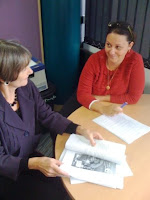Today was a great insight into the functions, roles, responsibilities and processes of the QTU.
The day began with the internal officers meeting, to discuss issues, commitments and new developments.
Mark Anghel, Kate Seed, Paige Bousen, Mandy Howse, Dr. John McCollow, Louise Comino and Leah Mertens participate in the internal officer's meeting.
Research Officers: Dr. John McCollow and Leslie McFarlane
- Cyberbullying, in partnership with Macrossans Lawyers and universities;
- Teachers and the new curriculum, in partnership with the QSA and professors headed by Professor Allan Luke;
- Digital literacies, in partnership with QUT and Waterford West State School.
Dr. John's research duties and responsibilities include indigenous education, special education and funding.
 Leslie McFarlane's research duties and responsibilities include curriculum and professional issues such as professional devlopment and teacher education.
Leslie McFarlane's research duties and responsibilities include curriculum and professional issues such as professional devlopment and teacher education.Both Dr. John and Leslie provide analysis and advice responding to QSA, government (federal and state) and EQ papers, reports, inquiries and reviews.
Legal / Services: Mark Anghel and Paige Bousen
Mark and Paige explained the diversity of requested and required support of QTU members and the levels and types of support and legal assistance the QTU provides.
Industrial Officers: Kate Seed and Louise Comino
Kate and Louise's responsibilities include protecting members' rights, industrial practices, EB implementation and the QIRC. They aim to campaign and negotiate towards resolution, through proactive rather than reactive strategies. As industrial officers, they liaise and represent in workplace reforms. They recognise that the QTU 'next step' has empowered members more.Tomorrow, we'll work shadow Kate to see her in action!
QTAD (QLD Teachers' Assist Desk) : Jo Botting
 Happy birthday QTAD! 5 years ago today was the launch of QTAD which aimed to offer direct support to member enquiries and concerns. Jo was integral in establishing and facilitating QTAD operations and both explained and demonstrated to us how collaborative and effective the support process is. QTAD has key staff plus officers/organisers available to provide fast or even immediate response to FAQs and general queries. They respond to 14,000-17,000 contacts per year (about 86/day) thanks to their effective, supportive database, response and referral system / processes.
Happy birthday QTAD! 5 years ago today was the launch of QTAD which aimed to offer direct support to member enquiries and concerns. Jo was integral in establishing and facilitating QTAD operations and both explained and demonstrated to us how collaborative and effective the support process is. QTAD has key staff plus officers/organisers available to provide fast or even immediate response to FAQs and general queries. They respond to 14,000-17,000 contacts per year (about 86/day) thanks to their effective, supportive database, response and referral system / processes.QTU Library - wow! The history!!!!
Our response to the resources and archives available in the QTU library was an overwhelming sense of nostalgia and respect for the history of the QTU, equity issues and workers' rights. It's interesting to see the headline on a QTU Journal from the 70's which could easily appear today - class size concerns! It seems that many issues in educational funding, resourcing and professional issues have come a long way but still are similar to 100 years ago. Oh to have the time to spend strolling through the archives and accessing the resources here just to immerse in QTU, education and industrial history. It would be great to see a column in the QTU Journal dedicated to showcasing some historical headlines, campaigns and classroom practices, such as "this month 80 years ago..." Many members would never again forget the struggles our predecessors experienced to achieve the rights and workplace conditions we now expect.
Paula and Meegan separated for the afternoon, so Paula could research in the library on women in the QTU and ASMP, and Meegan attended a branch meeting at a branch that she'd actually found campaign documents for from the 70's while in the library.
Woodridge Branch meeting
Branch President: Glenn Eglington (ESL Teacher, Logan Beaudesert District)Brisbane South Organiser: Kevina O'Neill
Guest Speaker: Paige Bousen "Teachers and the Law"




DAY TWO
ReplyDeleteI’ve decided to use the 3 questions that Michelle Ray gave us for homework (intended for the duration of the project) as a guide to explain my thoughts at the end of each day.
1. What did you enjoy the most? I appreciated the willingness of staff (officers and admin) to support the project by dedicating valuable time and expertise to us. I also enjoyed experiencing the history of the QTU by going into the ‘vault’ and reading old QTU Journals from as far back as the 1920s and hand written branch meeting minutes from 1964.
2. What did you learn about your own union? The organizational structure is pivotal to our success as an industrial entity. Being exposed to the processes & mechanisms has both further personalised the QTU for me and helped me understand it better
3. What will you take back to your workplace?
The experience of the machinations of an enquiry to QTAD (an amazingly well organised, dynamic & efficient system of dealing with the large volume of enquiries)
The understanding of the communication required between internal officers of the QTU…likened/paralleled to the middle management structures in large secondary schools.
Educational/Industrial Research processes & opportunities